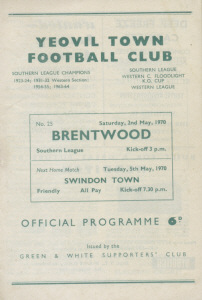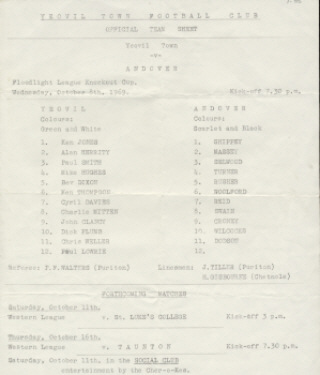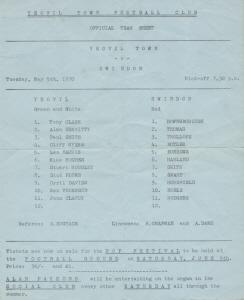
Unlikely it was noticed at the time, and even more unlikely anyone tempted fate by mentioning it, but there were strong similarities between the appointment of Mike Hughes and that of Alec Stock twenty-three years before. Both were in their late twenties and little known. And both applied almost on a whim, with few expectations, after stumbling across ads in national newspapers. Hughes was playing for Chesterfield when he happened to see the job. There were over twenty applicants, many with better qualifications for the post on paper, but the Yeovil board handed him the reins immediately upon meeting him, just as an earlier board had to Stock.
The internal battles at the club raged on throughout the summer. Meanwhile, almost unnoticed in the background, Hughes began bringing in new players. With little or no money he was relying on free transfers. Tony Clark had not made it at Exeter City and was languishing at Barnstaple Town. Stuart Housely had been released by Grimsby Town. Cyril Davies let go when Carlisle United disbanded their reserve side. John Clancy came from Bristol City. Ronnie Williams was from Swansea Town (they didn't become 'City' until 1970) and Paul Lowrie from Bristol Rovers. They all had a number of things in common. These weren't old Football League journeymen looking to extend their careers in the game a few years by dropping down to a part-time standard, but youngsters who had been told they wouldn't make the grade and so had a point to prove. They were cheap. The vast majority of Yeovil fans had never heard of them.
The final piece in the jig-saw was when Hughes persuaded Cliff Myers to resign just before the season began, though Myers insisted he be allowed to remain available on the transfer list. However there was no confidence when the campaign kicked off. Most supporters thought Yeovil would be lucky to complete its fixtures, and expectations were at an all time low. Less than 2,000 spectators turned up for the opening game of the campaign, and saw a loss. A point was thrown away in the second match, as Poole Town came back to draw. Things then went from bad to worse as Yeovil was humiliated 7-0 at Margate. Although the two-legged first round of the Southern League Cup against Trowbridge Town saw better performances the crowd was down to 1,300. Form was still stuttering. There was a much better effort in the return against Margate, won 5-2, but also a miserable 1-0 defeat by lowly Minehead in the Somerset Professional Cup. The chairman, Edmund Templeman, announced his resignation as Yeovil Town F.C. declared losses of �6,015 on the previous season and an overdraught of �17,000. At the AGM three weeks later Norman Burfield became the new chairman of the club.
It was, not for the first or last time, cup competitions that tided Yeovil over. Nothing impressive in the way of opposition, but a succession of replays provided desperately needed cashflow. A 0-0 draw away at Hereford United in the Southern League Cup saw a return at Huish that drew 3,512 and garnered �627 in ticket sales. Similarly in the F.A. Cup a 0-0 in the Fourth Qualifying Round in front of a record crowd of 2,580 at the Recreation Ground, Minehead, saw a replay at Huish that attracted 5,003. 1,900 programmes were sold, �100 taken on the the Golden Goal (it was a 0-0 draw after extra time), and �150 put across the bar. There was more revenue from a second replay in front of 2,719, played at the neutral venue of St James Park. A 5-0 victory brought Shrewsbury Town to Huish in the First Round proper, Yeovil losing 2-3, but more income with 6,355 all-pay. Nothing spectacular in the record books, but at the time the difference between survival and potential disaster.
League form was picking up and as Christmas approached Yeovil were into mid-table, and not too far behind the leaders in a very tight division. However the financial problems might have been given a breathing space, but they hadn't gone away. New chairman Norman Burfield was feeling the pressure and publicly named and criticised three players as the team lost three games in a row 0-1, including an exit from the Southern League Cup at home to Gloucester City. Club debts now stood at �25,000 and receivership was a distinct possibility.
On 13th January Yeovil Town played their first ever F.A. Trophy game, away at Corby Town. Only two goals in injury time made the score look vaguely respectable, the Glovers still losing 4-3. A miserable crowd in the new competition meant that after deductions and expenses the club profited to the princely sum of �10. When 1,384 turned up for the next home game in the league versus Dover Hughes had had enough and launched an open attack on the town in the local press. He accused the fans of living in the past, harping on about 1948-49, being too wrapped up in the F.A. Cup, and not deserving of the good side he was building. Many managers have burnt their bridges with supporters for far less than that, but maybe Yeovil fans knew they had a good one in Hughes, and perhaps deep down accepted there was some truth in his onslaught. Anyway at the next home game the attendance was back over 2,000 and pretty much stayed there for the rest of the season. It would have also helped Hughes that the team won seven of the next eight games.
 The Floodlight competition had continued to shed interest and Yeovil had dropped out of that league and were only involved in the cup aspect. The programme for it was now just a single typed sheet, 10" x 8". The example lower left is from the Round One tie played on October 8th against Andover. 937 spectators saw the home side win 4-0. Yeovil went out in the Second Round away at Weymouth 0-1. The club at last accepted the inevitable that the minority on the Board had long argued for, and tendered its resignation from the Western League to take effect at season's end. The Reserves would be disbanded.
The Floodlight competition had continued to shed interest and Yeovil had dropped out of that league and were only involved in the cup aspect. The programme for it was now just a single typed sheet, 10" x 8". The example lower left is from the Round One tie played on October 8th against Andover. 937 spectators saw the home side win 4-0. Yeovil went out in the Second Round away at Weymouth 0-1. The club at last accepted the inevitable that the minority on the Board had long argued for, and tendered its resignation from the Western League to take effect at season's end. The Reserves would be disbanded.
Amidst the gloom and despondency by early Spring Yeovil found itself competing at the head of the table, and by Easter we topped the league. On Easter Monday Weymouth were defeated 2-0 in front of 4,147 and the Glovers had pulled out a three point advantage. Six clubs were still seriously in the hunt, almost all with games in hand. Cambridge United were the most dangerous, with four.
No one could say Yeovil didn't battle to the last. With only five games left in their schedule they won every one. Nuneaton were defeated 3-0 at home. The team then travelled to Abbey Stadium and produced a monumental performance for a 2-1 victory. Back at Huish King's Lynn were demolished 4-0. Then the U's arrived for the rematch and 4,557 watched Dick Plumb (2), Stuart Housley amd Ken Thompson score the goals, to a single reply from Cambridge. But it was Cyril Davies who ran the show, tearing the visitors to shreds, and was man of the match for a performance described by the local press as "one of the finest individual performances ever given at Huish". The scouts were drooling and it was Charlton Athletic who stepped in, paying a then record transfer fee for Yeovil of �3,000 plus another �2,000 after ten appearances and a guaranteed home friendly, for a player Town had picked up on a free at the start of the season.
The victory over Cambridge took the title race to the final day, but with the U's making the most of their games in hand the destination of the Shield was not in the Glovers control. Brentwood Town were duly defeated 2-1 but Cambridge United also won, beating Margate, and took the Championship by a single point. It was a good year to take the title - they were elected to the Football League at the expense of Bradford Park Avenue. It was the fourth season in a row BPA had had to apply for re-election, the last three from 92nd position, and finally the old boy network failed to bend over backwards.
The programme top right (No. 25) is from that last game of the league campaign against Brentwood Town. After the ejection of the Yeovil Town Supporters' Club from Huish the new body sponsored by the club, the Green & White Supporters' Club, took over the production of the official programme. There were two different secretaries during the season. Dick Donovan was theoretically responsible until issue 16, with George Brown taking over from issue 17. However in practice the content they produced was pretty much restricted to Green & White Supporters' Club Notes. Almost everything else in the programme came from the pen and records of Bryan Moore.
 Whilst physically the programme remained the same, both in the page size (7�" x 5") and numbers (16) that had been in place from 1952, there was a major redesign of the front cover as if to emphasize the break with the immediate past. Inside content was not much altered. Around 55% of the programme was advertisments. Boardroom Notes normally occupied around a page, and Green & White Supporters' Club Notes half a page. Social Club Notes were occasional. Fixtures and results and tables for the Southern League and Western League occupied 1� pages in total. The team line-ups remained as the centre page spread, surrounded by ads. Opposition In Focus dedicated half a page to the visiting club, and Our Visitors another half page to very brief details on each of the opposing players and the manager. Stats were restricted to appearances, broken down into First Team and Reserves, and goalscorers across all competitions. Leading divisional goalscorers from the Southern League Premier and First were also listed. Manager's Notes were buried towards the back of the programme. The price remained the 6d it had been since 1961.
Whilst physically the programme remained the same, both in the page size (7�" x 5") and numbers (16) that had been in place from 1952, there was a major redesign of the front cover as if to emphasize the break with the immediate past. Inside content was not much altered. Around 55% of the programme was advertisments. Boardroom Notes normally occupied around a page, and Green & White Supporters' Club Notes half a page. Social Club Notes were occasional. Fixtures and results and tables for the Southern League and Western League occupied 1� pages in total. The team line-ups remained as the centre page spread, surrounded by ads. Opposition In Focus dedicated half a page to the visiting club, and Our Visitors another half page to very brief details on each of the opposing players and the manager. Stats were restricted to appearances, broken down into First Team and Reserves, and goalscorers across all competitions. Leading divisional goalscorers from the Southern League Premier and First were also listed. Manager's Notes were buried towards the back of the programme. The price remained the 6d it had been since 1961.
The third issue displayed (bottom right) is for the final game of the season, a friendly against Swindon Town on Tuesday May 5th. It was a single sheet in the format of the Floodlight Cup programme above. The visitors won 3-0. However the reason it's shown is that it advertised the Pop Festival to be held at Huish on Saturday June 6th, with tickets priced at 30/- and �1.00. It was the brainchild of Dick Donovan, and it was hoped that 10,000 to 20,000 would attend and thus help alleviate the club's desperate financial position. All local police leave was cancelled in expectation. In the event it was a disaster. Of the two headline bands, Nice chose that moment to break up, and Yes cancelled. With no major names on the bill less than 500 tickets were sold. Fortunately guarantors of the event shouldered some of the losses, but the club was plunged further into debt. Burfield, the club chairman, offered his resignation, but it was not accepted.
On a particularly sad note Len Dennett, who had produced the club programme from 1956-1963, died during the season at the desperately early age of 47.
|


